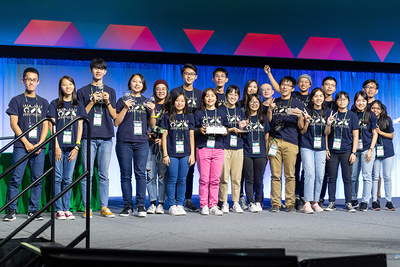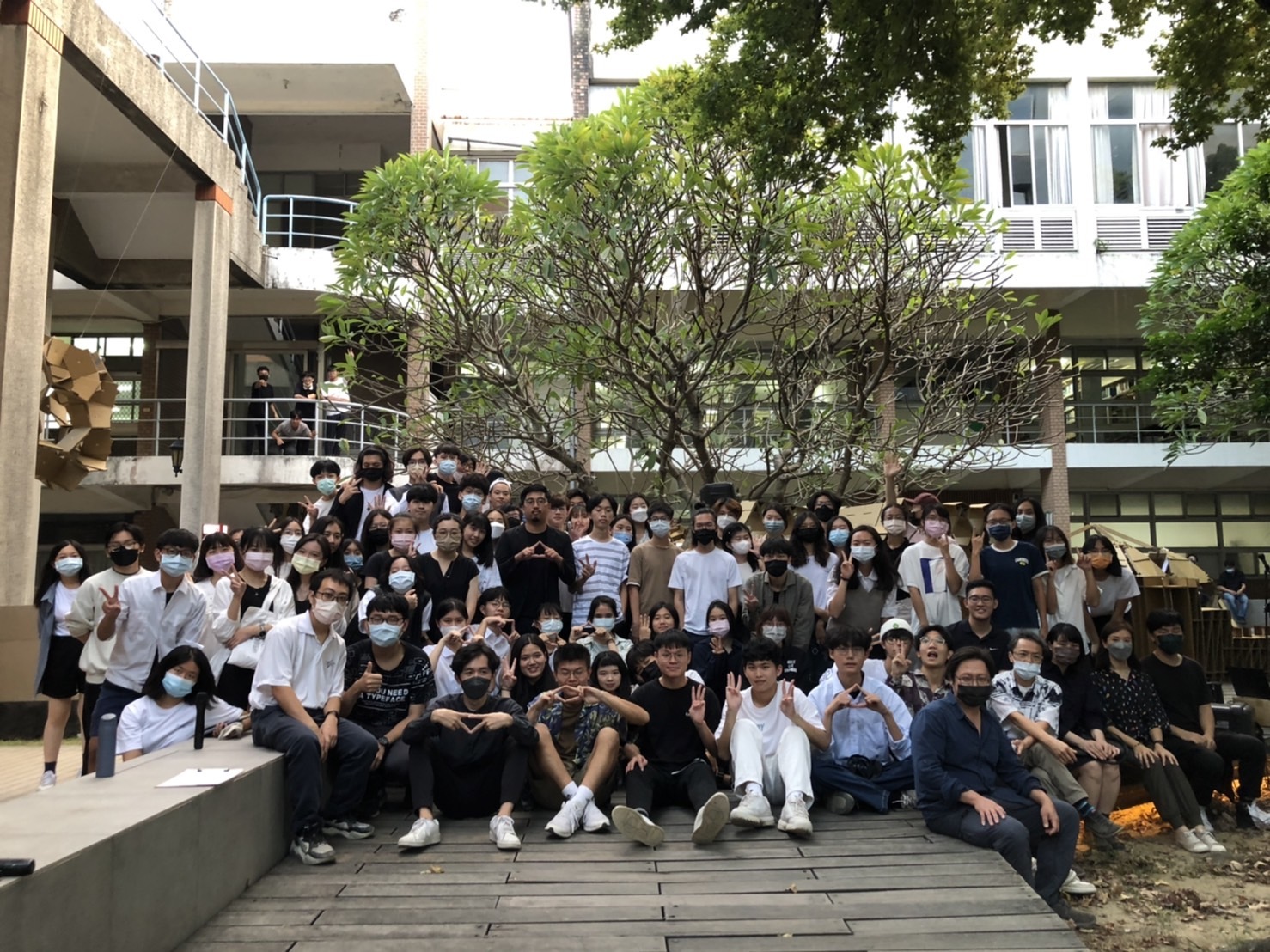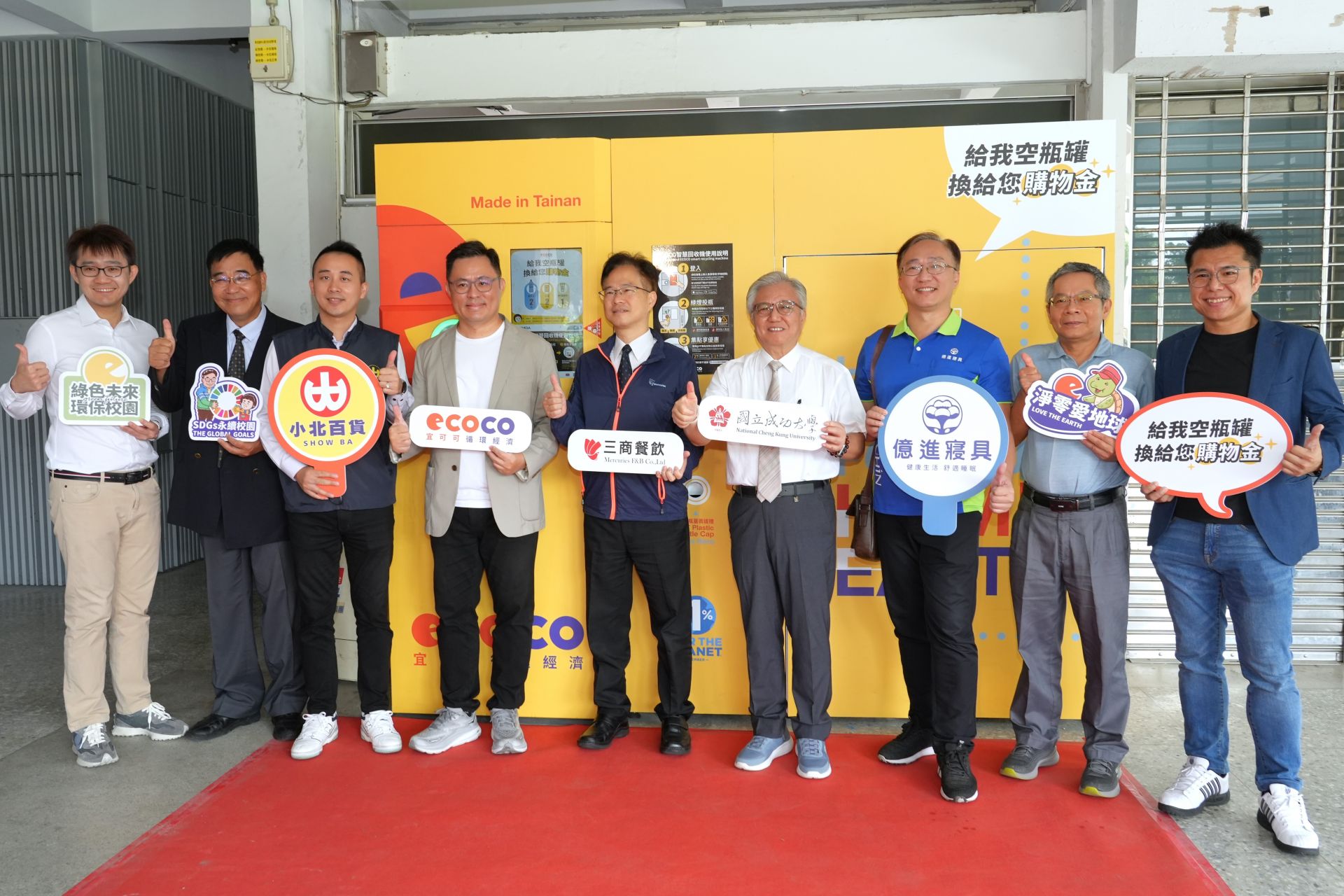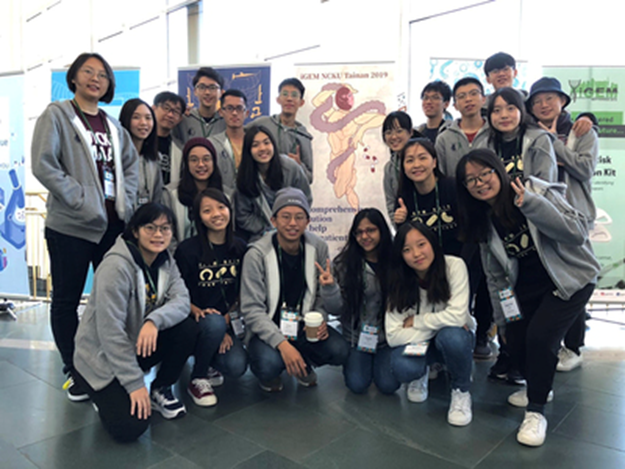SDG12
NCKU iGEM Team Wins the 2019 iGEM Competition Grand Prize with the Highest Scores in Taiwan’s Participation History
An interdisciplinary team from National Cheng Kung University (NCKU) participated in the 2019 International Genetically Engineered Machine (iGEM) in Boston, USA. The team, called iGEM NCKU Tainan, entered a team project named Oh My Gut, which was based on chronic kidney disease. Surpassing 346 international contenders, the iGEM NCKU Tainan team won the undergraduate team Grand Prize. The team demonstrated the most outstanding performance among all iGEM teams from Taiwan during the preceding decade. NCKU President Huey-Jen Su stated excitedly, “watched by nearly tens of thousands of spectators and with international broadcast, we proved that we have the top research abilities that constitute a winning team.” After celebrating their victory, members of the iGEM NCKU Tainan team expressed gratitude to NCKU for being the “greatest support for student research.”

In addition to winning the Grand Prize, the Oh My Gut project was nominated for 10 awards and won 5 of them, namely the Best Therapeutics Project, Best Presentation, Best Hardware, Best Model, and Best Measurement awards.
Professor I-Hsiu Huang of the Department of Microbiology and Immunology, who served as an advisor to the team, noted that previous student teams mainly selected environment-based project themes, but the student team of 2019 selected a treatment-based project. Thus, in addition to designing and creating instrument models, they were required to consider user safety and convenience. Therefore, the project required a meticulous consideration and exhibited a considerably higher difficulty level than previous projects did. Furthermore, English presentation abilities are crucial for large-scale international competitions. The iGEM NCKU Tainan team emphasized this aspect and won the Best Presentation award, a particular achievement for a team from a country where English is not the native language. In summary, the outstanding performance of the 2019 NCKU iGEM team was the result of the accumulated experiences of previous NCKU iGEM teams. In addition, members of the two previous NCKU iGEM teams provided support to the 2019 team; they even passed on advice about how to pass the microphone between speakers.
Sabrina Yeo Samuel, a third-year student of the Department of Biotechnology and Bioindustry Sciences revealed that the project took up most of the members’ extracurricular time. During July and August, the team endeavored to make preparations for the competition. Although team members envied their peers enjoying the summer, the team agreed that they should thoroughly prepare for the competition, because opportunities to participate in large-scale international competitions are rare. Despite the tiring preparation process, the outcomes of their preparation were abundant. Team members learned how to effectively conduct time management, honed their abilities to communicate and coordinate, and learned experimental techniques. These outcomes will support the team members in their future careers.
iGEM is a world-class synthetic biology and genetic engineering competition. By combining synthetic biology and genetic engineering with professional knowledge in electrical engineering, information management, medical, engineering, and physics fields, the competition aims to encourage the development of applications to resolve crucial issues. The 2019 iGEM competition was divided into 11 categories; participating teams included 47 high school teams, almost 200 undergraduate teams, and almost 100 post-graduate teams. From October 29, 2019, to November 8, 2019, the NCKU iGEM team participated in the 15th iGEM in Boston, USA. The team adopted a theme titled Oh My Gut and aimed to provide a novel treatment for patients with chronic kidney disease to resolve the issue of uremic toxin accumulation.
The NCKU iGEM team has won the Grand Prize each year since its first participation 3 years ago, thereby leading the promotion of interdisciplinary self-learning in higher education. Students from the team established the NCKU synthetic biology research club and recruited interdisciplinary members. In 2019, the club had 14 members from the College of Medicine, College of Engineering, and College of Bioscience and Biotechnology. Professors advising the club included Professor I-Son Ng of the Department of Chemical Engineering, Associate Professor I-Hsiu Huang of the Department of Microbiology and Immunology, Assistant Professor Masayuki Hashimoto of the Institute of Molecular Medicine, and Han-Ching Wang of the Department of Biotechnology and Bioindustry Sciences. Under their guidance, the club students selected research themes, challenged their fields of interest, transcended environment-related themes, and aimed to make a breakthrough in the medical field. The research results achieved outstanding outcomes in the iGEM competition; this was a successful example of the self-learning flipped classroom model.
In 2019, the NCKU iGEM team employed the concept of escape rooms and adopted novel methods to present their research findings. By creating Cresolve through synthetic biology, a patient’s p-Cresol level due to uremic toxin accumulation can be reduced. In addition, CreSense hardware was adopted to separate the serum and plasma, the fluorescence intensity emitted by green fluorescent proteins was used to analyze the proteins’ chemical residues. This enabled measurement of the blood concentration of p-Cresol. The team aimed to use this overall process, which was named CreSolution, to improve the quality of life of patients with chronic kidney disease.
The NCKU iGEM team indicated that each team member contributed considerable efforts throughout the 9 months of winter vacation training, intramural preliminary presentation of the selected theme, confirmation of the theme and further research, work on the project during summer vacation, intramural final presentation of the research results, and entry to the competition. The team stated, “we would like to thank everyone who helped the NCKU iGEM team. In particular, we would like to thank NCKU and Diamond Biofund Inc. for providing considerable resources and support. We believe that in the future, NCKU will continue to serve as the biggest supporter of student research.”
The iGEM competition was established by the Massachusetts Institute of Technology in 2003; it is participated in by student teams from countries worldwide who are passionate about biology. In the competition, student teams compete in the use of experimental design and genetic engineering to solve real-world problems. Therefore, the iGEM is an interdisciplinary competition that encompasses biology, medicine, energy, information engineering, and social participation. The objective of the competition is to “facilitate the research and collaboration of interdisciplinary fields and employ engineering techniques to create standardized Bio-Bricks, which are used to construct microorganism genomes with a variety of practical values in order to solve social issues.” The iGEM competition is frequently reported in internationally recognized science magazines, such as Nature, and receives participants from more than 30 countries.
Professor I-Hsiu Huang of the Department of Microbiology and Immunology, who served as an advisor to the team, noted that previous student teams mainly selected environment-based project themes, but the student team of 2019 selected a treatment-based project. Thus, in addition to designing and creating instrument models, they were required to consider user safety and convenience. Therefore, the project required a meticulous consideration and exhibited a considerably higher difficulty level than previous projects did. Furthermore, English presentation abilities are crucial for large-scale international competitions. The iGEM NCKU Tainan team emphasized this aspect and won the Best Presentation award, a particular achievement for a team from a country where English is not the native language. In summary, the outstanding performance of the 2019 NCKU iGEM team was the result of the accumulated experiences of previous NCKU iGEM teams. In addition, members of the two previous NCKU iGEM teams provided support to the 2019 team; they even passed on advice about how to pass the microphone between speakers.
Sabrina Yeo Samuel, a third-year student of the Department of Biotechnology and Bioindustry Sciences revealed that the project took up most of the members’ extracurricular time. During July and August, the team endeavored to make preparations for the competition. Although team members envied their peers enjoying the summer, the team agreed that they should thoroughly prepare for the competition, because opportunities to participate in large-scale international competitions are rare. Despite the tiring preparation process, the outcomes of their preparation were abundant. Team members learned how to effectively conduct time management, honed their abilities to communicate and coordinate, and learned experimental techniques. These outcomes will support the team members in their future careers.
iGEM is a world-class synthetic biology and genetic engineering competition. By combining synthetic biology and genetic engineering with professional knowledge in electrical engineering, information management, medical, engineering, and physics fields, the competition aims to encourage the development of applications to resolve crucial issues. The 2019 iGEM competition was divided into 11 categories; participating teams included 47 high school teams, almost 200 undergraduate teams, and almost 100 post-graduate teams. From October 29, 2019, to November 8, 2019, the NCKU iGEM team participated in the 15th iGEM in Boston, USA. The team adopted a theme titled Oh My Gut and aimed to provide a novel treatment for patients with chronic kidney disease to resolve the issue of uremic toxin accumulation.
The NCKU iGEM team has won the Grand Prize each year since its first participation 3 years ago, thereby leading the promotion of interdisciplinary self-learning in higher education. Students from the team established the NCKU synthetic biology research club and recruited interdisciplinary members. In 2019, the club had 14 members from the College of Medicine, College of Engineering, and College of Bioscience and Biotechnology. Professors advising the club included Professor I-Son Ng of the Department of Chemical Engineering, Associate Professor I-Hsiu Huang of the Department of Microbiology and Immunology, Assistant Professor Masayuki Hashimoto of the Institute of Molecular Medicine, and Han-Ching Wang of the Department of Biotechnology and Bioindustry Sciences. Under their guidance, the club students selected research themes, challenged their fields of interest, transcended environment-related themes, and aimed to make a breakthrough in the medical field. The research results achieved outstanding outcomes in the iGEM competition; this was a successful example of the self-learning flipped classroom model.
In 2019, the NCKU iGEM team employed the concept of escape rooms and adopted novel methods to present their research findings. By creating Cresolve through synthetic biology, a patient’s p-Cresol level due to uremic toxin accumulation can be reduced. In addition, CreSense hardware was adopted to separate the serum and plasma, the fluorescence intensity emitted by green fluorescent proteins was used to analyze the proteins’ chemical residues. This enabled measurement of the blood concentration of p-Cresol. The team aimed to use this overall process, which was named CreSolution, to improve the quality of life of patients with chronic kidney disease.
The NCKU iGEM team indicated that each team member contributed considerable efforts throughout the 9 months of winter vacation training, intramural preliminary presentation of the selected theme, confirmation of the theme and further research, work on the project during summer vacation, intramural final presentation of the research results, and entry to the competition. The team stated, “we would like to thank everyone who helped the NCKU iGEM team. In particular, we would like to thank NCKU and Diamond Biofund Inc. for providing considerable resources and support. We believe that in the future, NCKU will continue to serve as the biggest supporter of student research.”
The iGEM competition was established by the Massachusetts Institute of Technology in 2003; it is participated in by student teams from countries worldwide who are passionate about biology. In the competition, student teams compete in the use of experimental design and genetic engineering to solve real-world problems. Therefore, the iGEM is an interdisciplinary competition that encompasses biology, medicine, energy, information engineering, and social participation. The objective of the competition is to “facilitate the research and collaboration of interdisciplinary fields and employ engineering techniques to create standardized Bio-Bricks, which are used to construct microorganism genomes with a variety of practical values in order to solve social issues.” The iGEM competition is frequently reported in internationally recognized science magazines, such as Nature, and receives participants from more than 30 countries.

SDG12Dept. Architecture Explore Post-Epidemic Daily Meeting Point and Circular Economy with Paper Tectonic
View more
SDG12NCKU has partnered with San Shang Catering to adopt and install ECOCO smart recycling machines on campus
View more




















